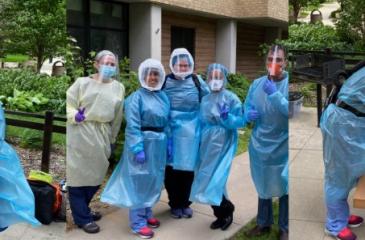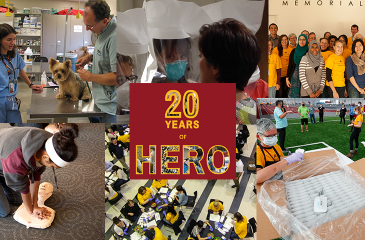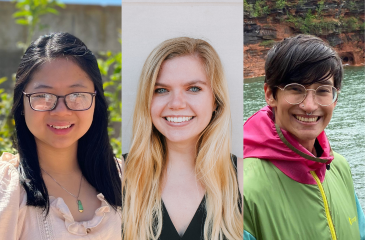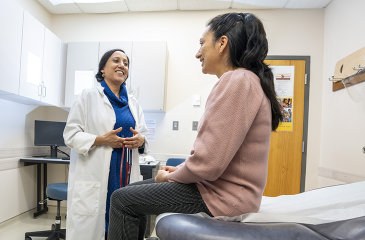Behind Dr. Roli Dwivedi’s desk is a world atlas. She keeps it close as a reminder that we are all human beings and share commonalities.
“Learning from each other gives meaning to medicine,” said Dwivedi, chief clinical officer at Community-University Health Care Center (CUHCC). “My patients give me so much joy and purpose.”
Dwivedi has worked at CUHCC, a community clinic in south Minneapolis, for 12 years. As a federally qualified health care center, CUHCC serves a diverse group of patients and is often the first entry to care for refugees and immigrants.
“It is important to build a care model that is holistic and looks at the whole person,” said Dwivedi. “We have developed a curriculum focused on global health and serve as a premiere education site for health sciences students and residents.”
As chief clinical officer, Dwivedi directs all services lines—including medical, psychiatry, dental, and case management— to ensure that policies, protocols, and procedures are in line with CUHCC’s vision of advancing health equity. Many of CUHCC’s patients belong to historically disadvantaged communities, and were the hardest hit by the COVID-19 pandemic. Dwivedi personally reached out to 1,200 patients to make sure they had access to food, transportation to pick up medicine for comorbid health conditions, and connected them to care coordinators if needed.
“A lot of my patients face social, economic, cultural, and racially-related barriers. We know that all those factors lead to inequities and poor health outcomes,” said Dwivedi. “In order to dismantle those barriers, now is the time for us to go out into communities and bring care to the people who need it most.”
DISPARITIES IN COVID RESPONSE TASK FORCE
Dwivedi is leading a University wide collaboration with Minnesota health departments, local and regional health care systems and communities to increase COVID testing in diverse communities. The Disparities in COVID Response Task Force aims to reduce disparity gaps by coordinating and disseminating resources on testing, mobile care, and immunization events.
“The task force brings together people with different skill sets and who are passionate about health equity,” said Dwivedi. “COVID-19 has given us the opportunity to shift our thinking towards providing a different type of care, moving beyond the medical model to a community-centered one and developing pathways of care beyond the boundary of a clinic or hospital.”
The interprofessional group will help identify and recommend culturally appropriate tools and promising practices to educate and engage communities and develop a sustainability plan for continued engagement.
“There’s a lot of broken trust in health care for communities who have experienced historical trauma,” said Dwivedi. The task force is partnering with community members to think through how to educate and engage different communities around COVID-19, its impact, and the importance of testing and vaccination.
“We are in a historical moment with the pandemic,” said Dwivedi. “We’ve been given an opportunity to create something which is innovative and is going to improve health outcomes and patient satisfaction. We have to think about moving the dial. The future is in mobile care. It can improve the entire professional practice.”
A WIDER VIEW OF THE WORLD
Dwivedi grew up in northern India and completed her medical internship where she went to patients’ homes in rural areas to provide care.
“Health care is set up right now in a way that patients receive care only where doctors are,” said Dwivedi. “It’s important that health care professionals go out and work with communities.”
CUHCC has been a big part of the Mobile Health Initiative, which unites University health professionals and community partners to deliver a range of urgently needed services to communities that have inadequate access to care because of long-standing racial and social injustices.
When the COVID-19 pandemic hit in March 2020, CUHCC pivoted overnight to optimize care delivery. They developed PPE guidance and shifted to telehealth. Dwivedi and her colleagues, dubbed the “CUHCC Dream Team,” went out to different highrises throughout the Twin Cities to provide free COVID-19 testing.
“When I go to public housing, my patients open up the door and are so happy to see me there,” said Dwivedi. “When you can sit down at the same level and start discussing care plans, it’s empowering. We are trying to improve health outcomes by putting patients in the driver's seat.”



